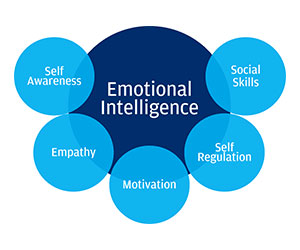 Commonly shortened to “EQ”, emotional intelligence is a vital component of successful relationships and achievement in a variety of spheres of life. Emotional intelligence, a term first used in the early 1990s by psychologists Peter Salovey and John Mayer, describes our capacity to identify, comprehend, and regulate our own emotions as well as those of others.
Commonly shortened to “EQ”, emotional intelligence is a vital component of successful relationships and achievement in a variety of spheres of life. Emotional intelligence, a term first used in the early 1990s by psychologists Peter Salovey and John Mayer, describes our capacity to identify, comprehend, and regulate our own emotions as well as those of others.
Five essential elements that make up emotional intelligence have been recognized by scholars and professionals over time. These elements cover a variety of abilities and conduct that support good interpersonal interactions, communication, and general well being. We’ll examine each of these elements in-depth in this extensive book, examining their importance and real world applications.
5 Components of Emotional Intelligence
1. Self Control
Self regulation, which builds on self awareness, is the capacity to restrain and regulate feelings, impulses, and actions. It entails controlling one’s emotions in a positive way while stifling the need to act rashly or unreasonably. Self regulation enables people to remain composed under pressure, make wise choices, and adjust to evolving conditions. Self regulatory abilities can be developed with the help of methods like assertive communication, deep breathing, and cognitive reappraisal. People who are skilled at self regulation can develop resilience and stay balanced in the face of adversity.
2. Managing Relationships
Emotional intelligence is characterized by effective relationship management, which includes the capacity to establish and preserve positive interpersonal relationships. This component calls for the use of abilities including cooperation, communication, and dispute resolution, all of which are critical for establishing mutual respect and trust.
Relationship managers put a high value on being open and honest with people, look for areas of agreement, and modify their strategies to accommodate different demands. By building strong bonds, they create a network of support that advances both individual and professional development. Relationship management abilities can be strengthened by techniques including showing gratitude, exercising empathy, and resolving problems in a constructive way. These techniques can also help to create successful personal and professional relationships.
3. Motivation
Motivation, the facet of emotional intelligence, is the will to work for objectives with vigor, perseverance, and optimism. Motivated people have a clear sense of purpose, establish ambitious but attainable goals, and maintain their composure in the face of failure. Rather than seeking approval from others or financial gain, they find joy in intrinsic benefits like self improvement, mastery, and fulfillment.
In order to cultivate intrinsic motivation, one must keep a growth attitude, celebrate accomplishments along the way, and match values with goals. Through the use of intrinsic motivation, people can overcome challenges, realize their goals, and encourage others to strive for greatness.
4. Self Knowledge
The ability to identify and comprehend one’s own feelings, ideas, and values is the foundation of emotional intelligence. High self-aware people are tuned in to their inner workings and can see their biases, triggers, strengths, and flaws. Their increased self awareness makes it possible for individuals to act authentically and clearly in difficult situations.
- 8 Proven Techniques to Improve Focus
Furthermore, those who are self-aware are skilled at tracking their feelings in real time, which enables them to control their reactions. Activities like journaling, self-reflection, and mindfulness meditation can help people become more self-aware and gain a better knowledge of their emotional terrain.
5. Awareness of Social Issues
Beyond self-awareness, emotional intelligence includes the ability to comprehend the feelings, viewpoints, and social dynamics of others. Empathy, or the capacity to correctly sense and understand the emotions and experiences of others, is a necessary component of social awareness. Those that are empathic listen intently, are perceptive to non-verbal clues, and genuinely care about the well of others.
Building social awareness encourages diversity, more effective teamwork, and deeper interpersonal relationships. Active listening techniques, perspective taking activities, and finding out different points of view can all improve social awareness and promote a society that is more connected and caring.
In order to successfully navigate the complexity of human connection and achieve both personal and professional success, one must possess a diverse range of abilities and behaviors that make up emotional intelligence. People can improve their emotional intelligence and flourish in all facets of life by developing self-awareness, self-regulation, social awareness, relationship management, and motivation. Accepting the concepts of emotional intelligence promotes societal harmony, empathy, and compassion in addition to enhancing individual well being.
Leave a Reply